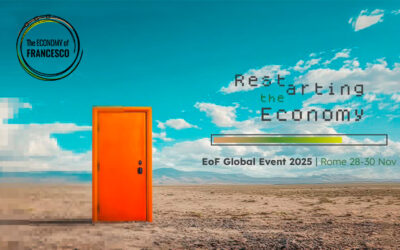Chiara Lubich on dialogue with Islam
Miss Lubich: If I’ve understood correctly, 6.000 muslims, participate in the activities of or rather, are directly involved in the Focolare Movement. Aren’t you afraid that your Movement will be subject to an uncontrollable influence by Islam?
I don’t think so. Participating in the activities of the Movement and above all being part of it in various ways, is not so simple.
It requires demanding training in living , a sustained, attentive, active sharing of objectives. This gives origin to a profound spiritual unity that surpasses all differences among the members of the Movement; a unity which is rooted on great, real and sincerely shared values. The unity achieved does not cancel out the differences, on the contrary, it makes of them elements of mutual enrichment, an opening to a deeper understanding of each other’s gifts.
Judging by the number of muslims involved in your initiatives, one might think that Islam is the Movement’s chief partner when compared to the other religions
I don’t think so. We have warm, profound, fruitful contacts with many Jewish people, with Hindus in India and with Buddhists, mainly in Thailand and in Japan. One need only think of the enduring spiritual friendship built with members of the vast Rissho Kosei-kai movement in Japan. I want to also mention the numerous participants who belong to the traditional religions in Africa who share our spirit and participate in the activities of the Movement. Entire tribes in the Cameroon are involved with the Focolare.
Contact with these spiritual and cultural realities takes place at different levels: from sharing in the joys and sufferings of everyday life to sharing one’s spiritual and material goods. There are meetings between experts in these religions so as to delve into the truth each one professes in order to get to know each other better and to acknowledge the riches that God has sown in humanity’s vast range of cultures. Just recently we held symposiums with Hindu intellectuals (the second such symposium), with Buddhists and in May with Jews at our International Mariapolis Center in Castelgandolfo (Rome)..
The spirit that animates the Focolare Movement seems to be so meek, perhaps one of the most meek of spirits to appear in the vast Catholic family: why do you suppose the most meek of all has chosen to address the most aggressive possible partner?
With regard to the meekness of the Movement’s spirit I should stress the fact that it does not imply surrendering nor passive acceptance, rather, total adherence to one of the Gospel’s beatitudes. Meekness is not a defense, it is an expression of love, therefore it is a force. On the other hand, we have not chosen our partners. We believe God brought us together. As for aggressiveness, generally speaking, we cannot forget the violence we Christians have inflicted on others and for which Pope John Paul II asked forgiveness. We cannot generalize when speaking of the aggressiveness of Islam. We know muslims who have great love for peace, who have a profound, vigorous spiritual life , who want to dialogue. They are the ones, in fact, who help us see Islam in a different light than the very often superficial way it is perceived. Besides, we should bear in mind that meekness authentically lived out by of one of two partners sooner or later leads the other to do the same.
In a letter to the focolarini in 1980 you gave them a directive: “ If in your cities there is a mosque or a synagogue or any other non Christian place of worship, that is your place…” After having heard violent words uttered in mosques would you still give that directive?
I feel it is more relevant than ever. It is the response to Jesus’ invitation to “ make ourselves one” with everyone. Besides, violent words are not preached in every mosque. As a matter of fact experience shows that if those violent words are spoken to people who love peace, those very words often can take on a different dimension and be echoed back to the persons who uttered them in a way that transforms them.
I know that in Pakistan you have established an islamic-christian center at Dalwal, between Lahore and Islamabad. Will it survive the anti-christian sentiment that rages in that country?
I hope so. The future, at any rate, is in God’s hands. Our main concern is to live the present moment planting seeds of fraternity and peace. If at times these seeds perish, that is part of Gospel teachings as well, and for this very reason they will bring about fruits of life that will never pass away, just as Jesus taught..
Have you undergone outside criticism and internal dissent after September 11th because of the monthly newsletter in Arabic written by an Iranian theologian who quotes passages from the Koran and from the Gospel?”
As far as I know there has been neither dissension nor criticism. There is instead an increase in the number of requests for the newsletter and an increase in the number of persons volunteering to help with this work, particularly other muslim scholars.
Luigi Accattoli
An interview published by Corriere della Sera (Italy)




0 Comments